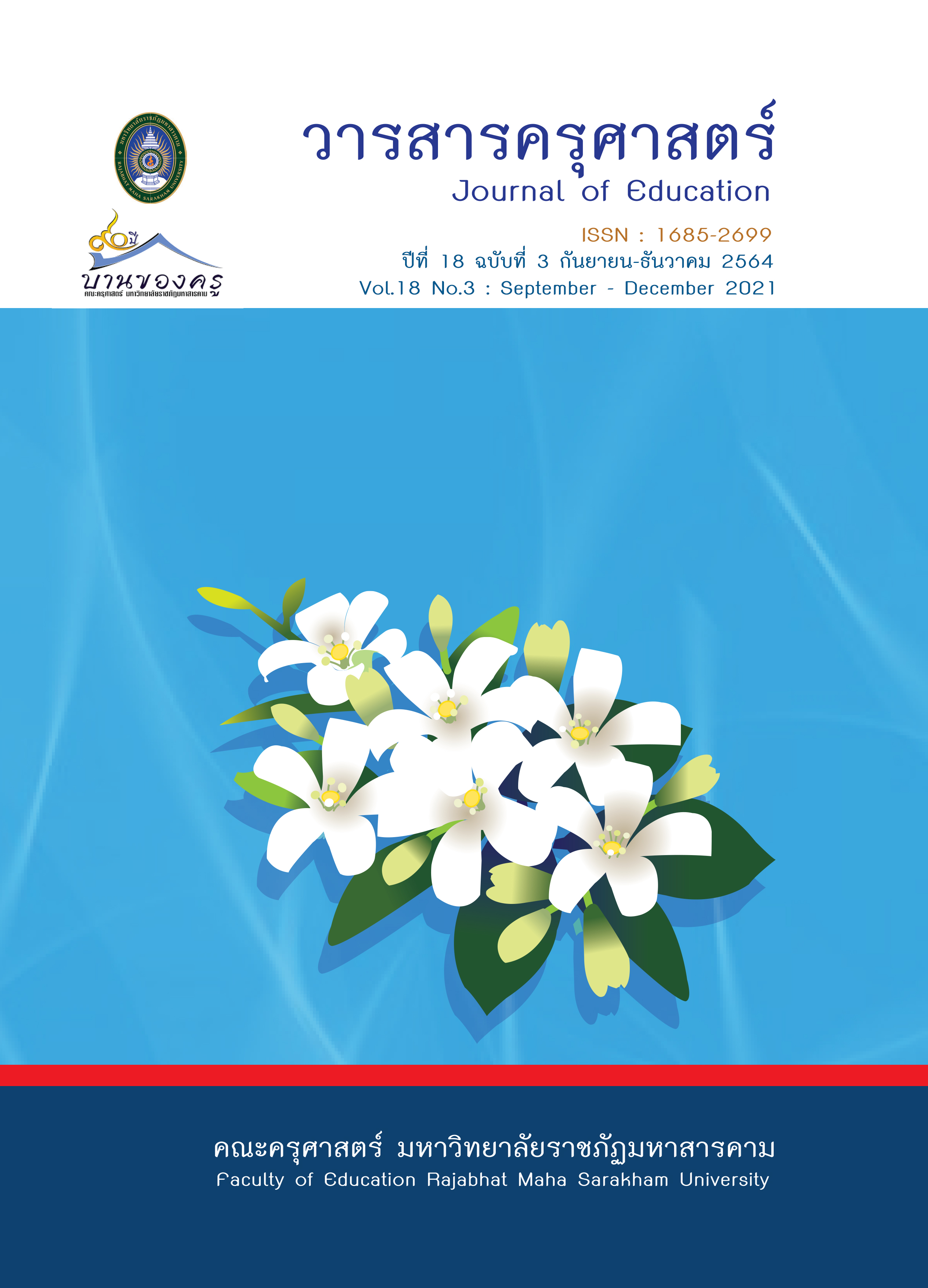Development Master Plan for Organizing Active Learning Experiences in Mathematics Instruction
Main Article Content
Abstract
The objectives of this research were (1) to develop a master plan of active learning management and (2) to survey mathematics’ opinions on teaching materials used in learning activities according to the master plan of active learning management. The sample of objective 1 was mathematics education research focusing on active learning and published during 2012-2020.The issues for synthesizing included active learning, using technology in teaching mathematics, and using English in communication in mathematics. The samples of the objective 2 were both groups of teachers who attended the training sub-projects 1 and 2 on ‘Development Prototype for Active Learning in Using Technology in Mathematics’, and ‘Development Prototype for Active Learning in Mathematical Communication’. The research results revealed that the main factors were policies and strategies for educational development at all levels, roles, and operations of educational institutions that support the learning environments, including continuous self-development of teachers. The results of teachers’ satisfactions on two sub-projects implemented according to the master plan found that the highest level of satisfaction in both sub-projects was more than 50 percent. The highest level of satisfaction on sub-project 1 was at 58% (n1 = 15, Mean = 4.57, S.D. = 1.32) and 60% (n2 = 15, Mean = 4.59, S.D. = 1.34) on sub-project 2.
Article Details

This work is licensed under a Creative Commons Attribution-NonCommercial-NoDerivatives 4.0 International License.
ข้อกำหนดเบื้องต้นที่ผู้นิพนธ์(ผู้ส่งบทความ) ควรทราบ
1. ผู้นิพนธ์ที่ประสงค์จะลงตีพิมพ์บทความกับวารสาร ตั้งแต่เดือนมกราคม 2563 เป็นต้นไป ให้ใช้รูปแบบใหม่ (Template 2563) โดยสามารถดูตัวอย่างได้ที่เมนู GUIDELINES
2. จะตีพิมพ์และเผยแพร่ได้ ต้องผ่านการประเมินจากผู้ทรงคุณวุฒิ (Peer Review)
3. การประเมินบทความโดยผู้ทรงคุณวุฒิ (Peer Review) เป็นแบบ Double Blind
4. การอ้างอิงบทความใช้หลักเกณฑ์ APA (American Psychological Association) คลิก
5. บทความถูกปฏิเสธการตีพิมพ์ ไม่ผ่านการประเมิน ผู้นิพนธ์ขอยกเลิกเองหรือชำระเงินก่อนได้รับการอนุมัติ ทางวารสารไม่มีนโยบายการคืนเงิน
References
Baskova, I. M. (2017). Preparing Non-native English Speakers for the Mathematical Vocabulary in the GRE and GMAT. Brigham Young University.
Council of University Presidents of Thailand [CUPT]. (2015, November 27). Roadmap for Education Reform 2013–2021 [Slides]. Parliament. https://www.parliament.go.th/ewtcommittee/ewt/edu/download/article/article_20141127130525.pdf
Ganesh, T. G., & Middleton, J. A. (2006). Challenges in linguistically and culturally diverse elementary settings with math instruction using learning technologies. The Urban Review, 38(2), 101-143.
Kaewsaiha, C., Boontawee, B., Tiprungsri, L., Kunasaraphan, K. & Kaewsaiha, P. (2020). Analysis of O-NET Results to Develop a Massive Online Open Course for Corrections of Misconceptions and Mathematical Errors of Junior High-school Students. Journal of National Educational Testing and Assessment, 1(1), 51- 73.
Kaewsaiha, C. & Ohama, P. (2017). Synthesis of Teaching and Learning Research Related to 21st Century Skills: Lesson from the Learning Mathematics (Research Report). Kaew Jao Jom Media and Publishing Center, Suan Sunandha Rajabhat University.
Kirkpatrick, A. (2007). World Englishes hardback with audio CD: Implications for international communication and English language teaching. Cambridge University Press.
Klose, R. (2015, March 14). Use and development of mathematical language in bilingual learning settings. CERME 9-Ninth Congress of the European Society for Research in Mathematics Education, 1421–1426. https://hal.archives-ouvertes.fr/CERME9-TWG09/hal-01287680v1
Kunasaraphan, K. (2018). Learning Abilities and Activities Based on Multiple Intelligences of First Year Students, International College, Suan Sunandha Rajabhat University. Journal of Science, Humanities and Social Science, 19(2), 337-392.
Likert, R. (1932). A technique for the measurement of attitudes. Archives of Psychology, 22(140), 5-55.
OECD Publishing. (2020). PISA 2018 Results (Volume V): Effective Policies, Successful Schools. Organization for Economic Co-operation and Development OECD.
Office of the National Economics and Social Development Council [NESDC]. (2019, n.d.). Summary of The Twelfth National Economic and Social Development Plan (2017-2021). NESDC. https://www.nesdc.go.th/nesdb_en/ewt_dl_link.php?nid=4345
The Institute for the Promotion of Teaching Science and Technology [IPST]. (2018). PISA Thailand Full Report. The Institute for the Promotion of Teaching Science and Technology. https://drive.google.com/file/d/1Y62NLj8zmr0FA_Y6B7lVMOYDosHUwF2a/view
The Institute for the Promotion of Teaching Science and Technology [IPST]. (2019). Basics Education Core Curriculum B.E.2551 (A.D.2008) Revised B.E. 2560 (A.D. 2017): Indicators and Core Learning Contents in Mathematics Area. The Agricultural Cooperative Federation of Thailand, Ltd.


